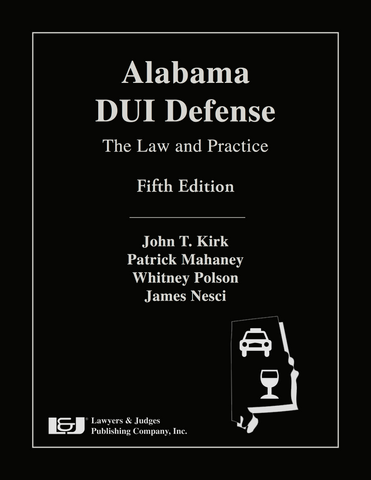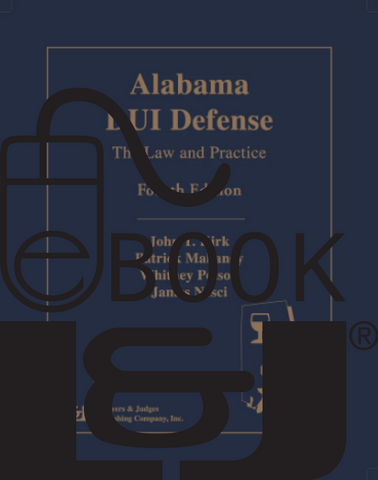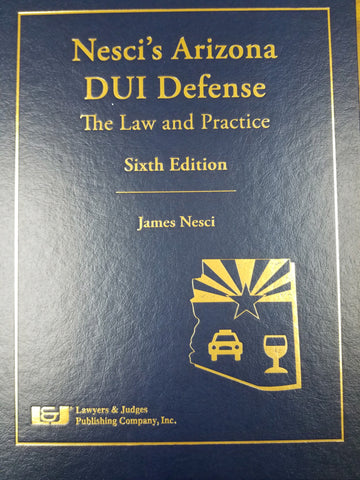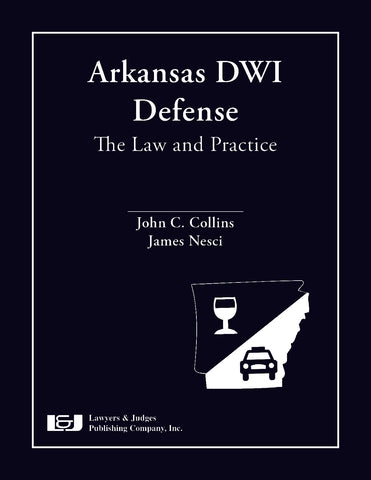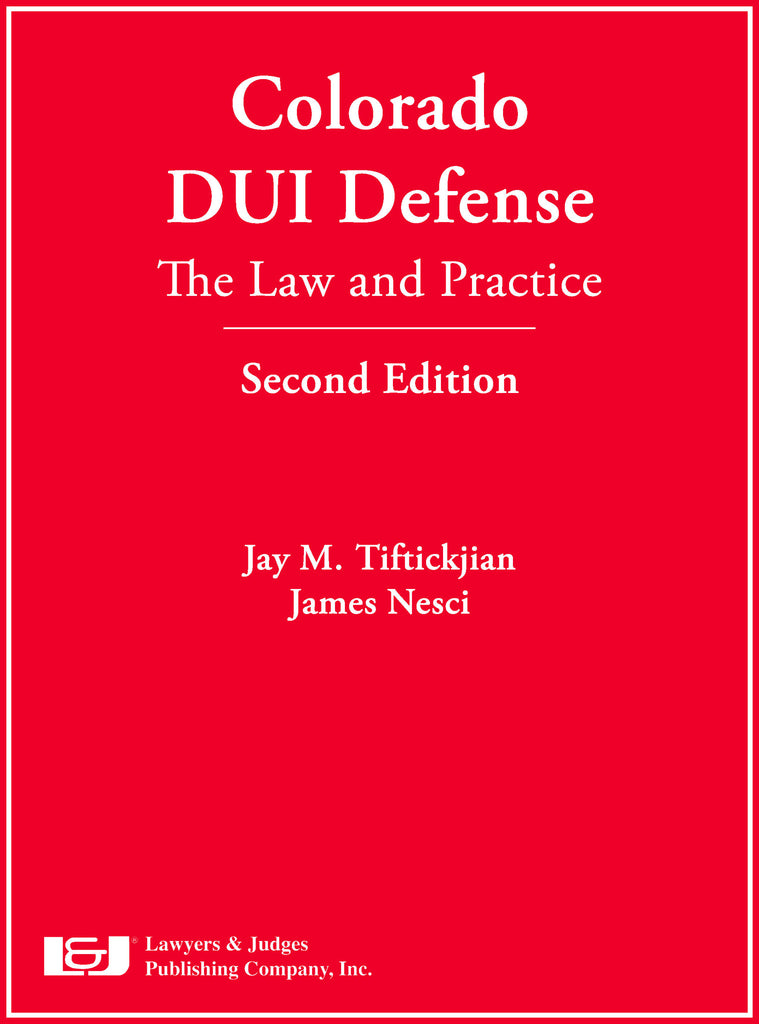
Colorado DUI Defense: The Law & Practice, Second Edition with DVD
-
Author: Jay M. Tiftickjian, James Nesci
-
ISBN 10: 1-936360-60-8
-
ISBN 13: 978-1-936360-60-4
-
Copyright Date Ed: March 10, 2017
-
Pages: 480
-
Binding Information: Casebound with DVD
- Size: 8.5 ✕ 11 Inches (US)
For even the most seasoned attorney admitted to practice in the State of Colorado, defending DUI cases has always presented special challenges. Today mounting a successful defense is more difficult than ever. Now you have the advantage with Colorado DUI Defense: The Law and Practice, Second Edition. This text and supplementary DVD contains the most important information to help you attain a successful verdict.
Written by Jay M. Tiftickjian and James Nesci, both members of the National College for DUI Defense, Colorado DUI Defense: The Law and Practice, Second Edition ensures that you understand the chemical, biological and technological concepts and issues underlying DUI prosecution and defense in the State of Colorado. The authors provide the most up-to-date information available on key areas of DUI law in Colorado including: DUI Investigations, Driving and Field Sobriety Testing, Drug Recognition, Evaluation and Chemical Testing, Blood Alcohol Calculations, Pre-trial Investigations and Motions, Practice, Plea Offers and Agreements, DUI Trial Procedures, and more.
This Second edition is expanded from the previous one, and includes new cases, new sections on social media use for attorneys and liquid chromatography mass spectrometry, police radio codes, motions in limine, sentencing, field sobriety testing (2013 FST Manuals), blood testing uncertainty, drug-related driving offenses, the latest Colorado statutes, and more, making this text the most important book to have with you in all phases of a DUI case, from investigation to trial.
Many practical tools and applications designed to streamline and simplify the complex DUI defense process have been developed along with this book. They are all included on a bonus DVD--so you can locate, review and print them out in a matter of seconds. The companion DVD contains NHTSA studies, articles and visual detection videos.
Included are the NHTSA Student and Instructor Manuals for 2013 & 2015, the DRE pre-School & DRE School Manuals, and the ARIDE for 2013—the latest edition from NHTSA! Some vendor sell these together for $400 or more. They are all included on the DVD at no extra charge!
Lawyers & Judges has published twenty state-specific DUI defense reference books. A practitioner in Colorado raved in the Colorado Lawyer that Colorado DUI Defense: The Law and Practice is “a must-have resource” and would make “a nice gift for the lawyers in your life who practice DUI defense.” The Wisconsin Lawyer reviewer gave Wisconsin OWI Defense: The Law and Practice a touchdown review, calling the book “the best book I have read pertaining to Wisconsin operating-while-intoxicated (OWI) law, and one of the best in dealing with the substance of OWI law”
Book Topics Include:
- Lawyer Advertising
- Basic Client Relations & Representing Clients with Special Circumstances
- Alcohol- and Drug-Related Driving Offenses
- Division of Motor Vehicles (DMV)
- Pre-Trial Investigations
- Pre-Trial Motions Practice
- Plea Bargains & Convictions
- Trial
- DUI Investigations: Driving and Field Sobriety Testing
- Drivers Under the Influence of Drugs
- Chemical Testing
- Blood Alcohol Calculations
- Expert Witnesses
DVD topics include:
- NHTSA Advanced Roadside Impaired Driving Enforcement (ARIDE) Manuals 2013
- Automobile & Motorcyclist Pamphlets
- AZDPS Blood Alcohol Testing Uncertainty Budget
- NHTSA Drug Recognition Expert Course (DRE) 7-Day School 2013
- NHTSA Improved Sobriety Testing
- NHTSA DWI Detection and Standardized Field Sobriety Testing
- Standardized Field Sobriety Testing Validation Studies
- And more!
Table of Contents
Tables of Cases
Authors’ Comments
How to Use This Book
Preface to the Second Edition
Chapter 1: Lawyer Advertising
1.1 Ethical Issues in Advertising
1.2 Colorado’s Rules of Professional Conduct on Advertising
Colo. RPC 7.1 Communications concerning a lawyer’s services
Colo. RPC 7.2 Advertising
Colo. RPC 7.2 Referral fees
Colo. RPC 7.2 Referral services
Colo. RPC 7.3 Direct contact with prospective clients
Colo. RPC 7.4 Communication of fields of practice
Colo. RPC 7.5 Firm names and letterheads
1.3 Marketing Advice
1.4 Advertising Resources
A. Phone Book Advertising
B. Internet Advertising
C. Social Media
1. Ethical Concerns
2. Confidentiality vs. Privilege
3. The 3 Tenets of Social Media: Timeliness, Honesty, and Transparency
4. Facebook
5. Twitter
6. Social Media as a Research Tool
7. Final Thoughts on Social Media
D. Giveaways
E. Television
F. Print
Chapter 2: Basic Client Relations & Representing Clients with Special Circumstances
2.1 Meeting the Prospective Client
2.2 Client Intake Questions
2.3 Client Intake Interview
2.4 Fees
2.5 Fee Agreements
2.6 Colorado Lawyer Trust Account Foundation (COLTAF)
2.7 Communication
2.8 Client File Retention
2.9 Collateral Consequences
2.10 Representing the Military Client for DUI
2.11 Pilots and Merchant Marines
2.12 Non U. S. Citizens—Immigration Consequences
2.13 Canadian Travel
Chapter 3: Alcohol- and Drug-Related Driving Offenses
3.1 Introduction
3.2 The Statute
3.3 Definitions—Common Elements
3.4 Pretrial Conditions
3.5 Penalties
3.6 Vehicular Assault and Vehicular Homicide
3.7 Underage Drinking and Driving (UDD)
3.8 Other Offenses Related to DUI
3.9 Costs and Restitution
3.10 Federal Court Jurisdiction
Chapter 4: Division of Motor Vehicles (DMV)
4.1 Overview
4.2 Colorado’s Express Consent Law
4.3 Revocation Based on Administrative Determination
4.4 Mandatory Revocation of License Subsequent to Criminal Conviction
4.5 Excessive Points Suspensions
4.6 Driver’s License Reinstatement
4.7 Multiple Conviction Revocations
4.8 Habitual Traffic Offender
4.9 Length of Driver’s License Revocations—Minor Drivers
4.10 Length of Driver’s License Revocations—CDL
4.11 Out-of-State Convictions
4.12 Out of State Reinstatement Issues
4.13 Interstate Driving Consequences
Chapter 5: Pre-Trial Investigations
5.1 Overview
5.2 Case File Organization
5.3 Visiting the Scene
5.4 Photography and Videos
5.5 Diagrams and Aerial Photography
5.6 Accident Reconstruction
5.7 Event Data Recorders (Black Boxes)
5.8 Roadblock (a.k.a. “DUI Checkpoint”) Investigations
5.9 Police Radio Codes
Chapter 6: Pre-Trial Motions Practice
6.1 Overview
6.2 Procedural Motions
6.3 Motions to Suppress
6.4 Motions in Limine
Chapter 7: Plea Bargains & Convictions
7.1 Overview: Plea Bargains
7.2 Waiver of Rights
7.3 Exposure of Prior Offenses
7.4 Subsequent Offenses
7.5 Out of State and Minor Prior Offenses
7.6 Misdemeanor Plea Offers
Chapter 8: Trial
8.1 Overview
8.2 Voir Dire and Jury Selection
8.3 Jury Instructions
8.4 Opening Statements
8.5 Cross-Examination
8.6 Direct Examination
8.7 Closing Argument
Chapter 9: DUI Investigations: Driving and Field Sobriety Testing
9.1 Overview: National Highway Traffic Safety Administration (NHTSA)
9.2 Driving Behavior
9.3 Standardized Field Sobriety Testing (SFST) Validation Studies
9.4 Analysis and Summary of the SFST Validation Studies
9.5 Standardized Field Sobriety Test Battery
9.6 Horizontal Gaze Nystagmus (HGN)
9.7 Walk and Turn
9.8 One-Leg-Stand
9.9 Commonly Used Non-Standardized/Non-Validated Field Sobriety Tests
9.10 Advanced Roadside Impaired Driving Enforcement (ARIDE)
9.11 Refusal of SFSTs and General Admissibility
9.12 Videotaping the Driving and Investigation References
Chapter 10: Drivers Under the Influence of Drugs
10.1 Overview
10.2 Colorado’s 5 Nanogram THC Inference
10.3 The Drug Recognition Evaluation
10.4 Seven Categories of Drugs
10.5 Effects of Various Drugs
10.6 Drug Evaluation Classification Protocol (DECP)
10.7 Drug Evaluation Classification Training Program
10.8 The 12-Step DRE Protocol
10.9 Deconstruction and Analysis of the 12-Step DRE Protocol
Chapter 11: Chemical Testing
11.1 Preliminary Screening Tests
11.2 Fundamentals of Breath Testing
11.3 Intoxilyzer 9000
11.4 Breath Testing: Methods of Attack
11.5 Blood Testing: From the Vein to the Lab
11.6 Marijuana Testing
11.7 Marijuana Pharmacology: Pharmacokinetics of THC
11.8 Urine Sample Collection
11.9 The Laboratory
11.10 THC Analysis: Methods
11.11 Confirmatory Testing for THC
11.12 Method Validation—Limits of Detection and Quantification
11.13 Quantitative Analysis for THC in Whole Blood Serum and Plasma
11.14 Detecting and Identifying THC
11.15 Summary (THC)
11.16 Detecting and Identifying Drugs other than THC
Chapter 12: Blood Alcohol Calculations
12.1 Blood Alcohol Calculations for Attorneys
12.2 Determining the One-Drink Potential
12.3 Elimination and Retrograde Extrapolation
12.4 White’s Retrograde Extrapolation
12.5 Partition Ratio Conversions
12.6 Unit Conversions
Chapter 13: Expert Witnesses
13.1 Overview
13.2 Definition of Expert Testimony
13.3 Pretrial Preparation
13.4 The Prosecutor’s Expert Notice Requirements
13.5 The Confrontation Clause
13.6 Confrontation Notice Requirements
13.7 Defendant’s Notice Requirements for an Expert Witness
13.8 Cross Examination of the State’s Expert Witness
13.9 Direct Examination of the Defense Expert Witness
13.10 Direct Examination of the State’s Expert as a Defense Witness
Chapter 14: DUI Warpack
14.1. DMV Proceedings
A. Jurisdiction
B. Subpoenas
C. Elements
1. Actual physical control
2. Probable cause
3. Per se standards and statutory presumptions
4. What constitutes a “refusal”?
D. Defenses and Motions to Dismiss
1. Unlawful stops
2. Delays in requests by police
3. Unavailability of test chosen by driver
4. Improper and confusing advisements
5. Recantation of refusals
6. Non-appearance of police officer or other subpoenaed witness
E. DMV Orders and Decisions
1. In general
2. Appeals
14.2 Pre-Trial Investigation
A. Discovery
1. Overview of Crim. P. Rule 16
2. Cases interpreting Rule 16.
B. Exculpatory Evidence & Brady Materials
C. Subpoenas
D. Open Records Act
E. Court-Appointed Experts & Investigators
F. Discovery Violations
1. Violations by the prosecution
2. Violations by the defense
14.3 Client Competency
14.4 Pre-trial Suppression Motions
A. Fourth Amendment/Privacy Issues
1. Reasonable expectation of privacy/standing
B. The Exclusionary Rule
1. In general
2. Independent source exception
3. Inevitable discovery exception
C. Investigatory Stops
1. Reasonable suspicion
2. Purpose and scope of the stop
3. Consensual encounters
D. Seizures
1. In general
2. Roadblocks & checkpoints
E. The Warrant Requirement & Probable Cause
1. In general
2. Exceptions to the warrant requirement
a. Search incident to arrest
b. Exigent circumstances
c. The automobile exception
d. Consent
e. Inventory searches
f. Plain view
g. Entry into home
F. Forced Blood Draws
G. Statements of the Accused
1. Voluntariness
2. Miranda, generally
3. Custody
4. Products of illegal searches and seizures
5. Invocation
6. Pre- and post-arrest silence
7. Governmental promises
H. Experts
1. Admissibility of expert testimony in general
2. Notice requirements of C.R.S. §16-3-309(5)
3. Nystagmus testing
4. Drug recognition experts
14.5 Sixth Amendment Issues
A. Right to Counsel
1. In general
2. Counsel of choice and substitution of counsel
3. Waiver
4. Right of self-representation
5. Ineffective assistance
6. Conflict-free counsel
14.6 The Confrontation Clause
A. In General
B. Crawford Issues and Lab Reports
14.7 Trial Framework
A. Speedy Trial
B. Continuances and “Due Diligence” in securing witnesses
C. Jury Issues
1. Jury impaneling
2. Peremptory challenges
3. Challenges for cause
4. Batson issues
5. Challenges to the venire: racial composition
D. Judge’s Role
E. Opening Statements—Scope and Purpose
F. Jury Deliberations
1. Timing
2. Nondisclosure & delayed disclosure
3. Consulting outside sources
4. Exposure to media
5. Coercion
6. Third-party contact
7. Contact with defendant
8. Jury questions
9. Jury deadlock & modified-Allen instructions
10. Polling the jury
G. Right to Testify / Curtis
14.8 Cross-Examination
A. In General
B. Cross-Examination of Experts
C. Impeachment with Evidence of Criminal Activity
1. Felony convictions
2. Misdemeanor convictions
3. Juvenile adjudications
4. Deferred prosecutions and/or judgments
5. Arrests
6. Correcting false impressions
7. Finality of conviction
D. Impeachment with Character Evidence
E. Prior Statements
F. Impeachment with Evidence of Bias, Motive or Prejudice
1. Pending charges, probationary status, immunity & plea bargains
2. Affiliations & memberships
3. Civil litigation
4. Hostility of witness
5. Racial bias
6. Extrinsic evidence
H. Impeachment with Evidence of Mental Condition and/or Therapy
I. Impeachment with Evidence of Drug and/or Alcohol Use
14.9 General Evidentiary Issues
A. Witness competency
B. Expert & lay testimony
C. Relevancy & unfair prejudice
D. Character & other acts evidence, 404(a) and (b)
E. Hearsay
F. Business records
G. Judicial notice
H. Privileges & confidential records
I. Interpreters
J. Foundation & authentication
K. Videotapes, documents & demonstrative evidence
14.10 Prosecutorial Misconduct
A. Improper Arguments to the Jury
1. Shifting or reducing the burden of proof
2. Name-calling
3. Improper comments on witness credibility
a. Improper vouching
b. Denigrating defense experts
c. Calling defense witnesses “liars”
4. Belittling lesser offenses
5. Attacks on defense counsel
6. Urging juries to perform experiments
7. Inflammatory appeals to passion & prejudice
8. Misstating law and/or evidence
B. Other
14.11 Jury Instructions
A. Elements & Definitions
B. Affirmative Defenses and Traverses
C. Theory of the Case Instruction
D. Unanimity Instructions
14.12 Defenses and Elemental Issues Concerning Specific Offenses
A. In General
1. Definitions of “driving or operating”
2. Definitions of “vehicle” and “motor vehicle”
3. Definitions of “streets and public highways”
4. Involuntary intoxication
B. Careless & Reckless Driving
C. Leaving an Accident Scene & Failure to Report Accident
D. Vehicular Eluding
E. DUI/DWAI
F. Driving Under Restraint
G. Habitual Traffic Offender
H. Vehicular Assault & Homicide
I. Lesser-Included and Non-Included Offenses
J. Inconsistent Verdicts
K. Statute of Limitations
14.13 Plea Bargains & Guilty Pleas
A. In General
B. Advisements
C. Conditional Guilty Pleas
D. Withdrawing Guilty Pleas
14.14 Double Jeopardy, Merger & Multiplicity
14.15 Sentencing
A. Generally
B. Right to Speedy Sentencing
C. Apprendi/Blakely issues
D. Restitution, Fees, Costs & Civil Forfeiture
E. Pre-Sentence Confinement
F. Collateral Consequences
G. Immigration Consequences
14.16 Appellate Jurisdiction & Procedure
A. Jurisdiction
B. Procedure
C. Standards of Review
14.17 Post-Conviction
A. Appeal
B. Crim. P. 35(a)
C. Crim. P. 35(b)
D. Crim. P. 35(c)
1. Collateral attack of prior convictions - grounds
2. Time bar & successive motions
E. Motions for Return of Property
F. Motions to Seal Records
G. Newly-Discovered Evidence
14.18 Probation Revocation
A. Procedure
B. Probation Conditions
C. Appeal
14.19 Miscellaneous Constitutional Issues
A. Separation of Powers
B. Vagueness & Overbreadth
C. Equal Protection
14.20 Other Issues
A. Right to Make a Contemporaneous Record
B. Law of the Case
C. Contempt of Court
D. Statutory Interpretation
Appendix A: DWI—Modern Day Salem Witch Hunts
by Mimi Coffey, Esq.
Appendix B: The Aging Process and Field Sobriety Tests
by Mimi Coffey, Esq.
Appendix C: Fear and the DWI Field Sobriety Tests
by Mimi Coffey, Esq.
Appendix D: The Fallacy of the Police Administered ‘Finger to Nose’ Test to Determine Alcoholic Sobriety
by Patrick Mahaney, Jimmie L. Valentine, and Valerie Valentine Acevedo
Appendix E: Disc Materials
About the Authors
Index

